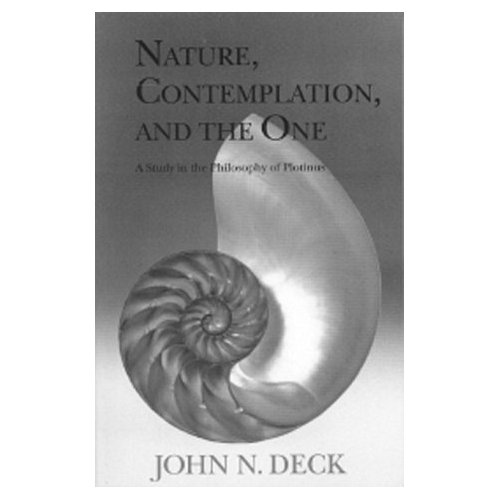
AnthonyFlood.com
Panentheism. Revisionism. Anarchocapitalism.

Nature, Contemplation, and the One
From the journal Alexandria, Vol. 2, 1993, pp. 400-01. See also O'Meara's memoir of Deck.
Review of Nature, Contemplation, and the One by John N. Deck. Foreword by Lawrence Dewan. Burdett, NY: Larson Publications, 1991. 152 pp.
James O'Meara
John Deck taught in the philosophy department of The University of Windsor from 1955 to his death in 1979. If Ontario doesn't sound like a center of philosophical activity, one could respond that Deck wasn't exactly teaching academic "philosophy," and that consequently this book is not a typical academic treatise, despite showing a few traces of its origin as a dissertation submitted to the University of Toronto.
Instead, Deck uses Plotinus' extraordinary idea of Nature as a "contemplative producer," brining about the world of trees, plants, and earth by its own Contemplation, as a key providing access to the whole structure of Plotinus' universe: "Contemplative producing (is) a synthesizing principle (which) co-ordinates best Plotinus' picture of the world." As such, no student of Plotinus, or of consciousness generally, can ignore this systematic exploration of the West's most profound and influential metaphysician.
Deck takes this initially "dreamy" notion and brilliantly unpacks it as being the result of gradually introducing more and more duality or "otherness" into the "primary instances" of being and knowing: the super-Being and super-Knowing proper to the One. In this way Deck derives, chapter by chapter, the various levels of Plotinus' multi-storied universe. At the same time, our metaphysical "concepts" of non-dual Being and Knowledge are validated by showing how they can be "built-up" from their everyday counterparts by gradually strengthening the weak and incomplete grasp they ordinarily have of their objects.
Deck's book is also important as a kind of demonstration project. He shows the post-Enlightenment skeptic how the non-causal, "top-down" method of explanation, common to Idealism from Plato to Hegel to Whitehead, can provide substantive and spiritually useful results. Consistent with this perspective, the results are presented here in a way that mirrors Plotinus' own method, "adopt(ing) many perspectives and mov(ing) eventually to synthesis," in accordance with the intuitional, as opposed to "logical," nature of metaphysical doctrine. As Deck says of Plotinus, "he does not so much prove his propositions as accustom his readers to their truth" by circling around some initial metaphors and intuitions (such as the "playful" suggestion that Nature contemplates) until the reader suddenly finds himself already having a grasp of a whole doctrine.
Readers who come to the text with some background in Plotinian scholarship will also be interested in Deck's unique discussions of such issues as whether a kind of non-dual "super-Knowledge" can be truly predicated of the One (basing himself on the idea of "wakefulness" in Enneads 6.8.16), and whether the One's emanation of the Nous is a separate act from its own prior act of self-subsistence (where he draws on the distinction between the "act of the entity" and the "act from the entity" in Enneads 5.4.2).
Finally, all readers will be enriched by Deck's chapter "Is Nature Real for Plotinus?" where he shows that Nature, precisely by being Contemplation in its truest form, is actually more "real" than we ordinarily than we ordinarily believe: "Plotinus does not have two worlds, but only one. His world of true being . . . is the everyday world .. . when the latter is known by the best knowing power (i.e., the Nous or Intellect)." The nature of Reality, in short, is Consciousness.
Larson has done a superb job in reissuing this book. The Greekless reader will benefit by the transliteration of Deck's copious Greek quotes. Lawrence Dewan's Foreword places Deck as a member of the "workshop of Plotinus," and the Publisher's Preface recalls the immense influence Deck had on the late Anthony Damiani. This is indeed a worthy addition to Larson's "Classic Reprint Series."
Posted June 17, 2006